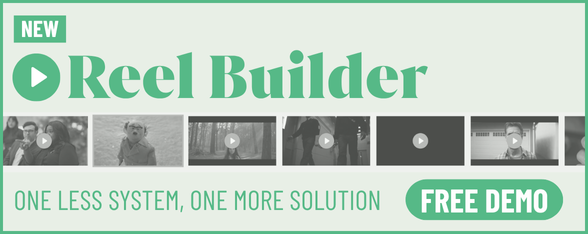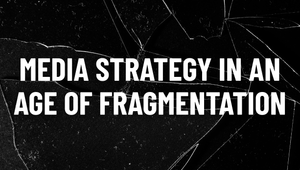
“Advertising Helped Me Write About Serial Killers”

“I’m here to prove that there is life after advertising and I’m pulling you all out.”
James Patterson is a globally renowned author, who’s known for his smash hit thrillers like ‘Along Came a Spider’ and ‘Kiss the Girls’, his iconic characters like Alex Cross and the gang from the ‘Women’s Murder Club’. What you might not know is that before writing some of your favourite holiday reads, James worked in advertising. And what you almost definitely don’t know is that he was the first boss of Liz Taylor, who is now the global CCO of Ogilvy.
The pair have come to Cannes to give attendees unmissable storytelling advice - and, perhaps, to inspire the copywriters and journalists in the audience to get off their butts and write that thing.
Their session at Cannes, ‘Hungry Dogs Run Faster’, saw Liz and James share nuggets of insight and inspiration from his career, starting with the very title of the talk.
“You have to have somebody to believe in you. My grandmother was the one who believed in me,” he said, though she didn’t believe he would make it in the NBA. “Her thing was, hungry dogs run faster, and I still am a hungry dog at my age.”
Before coming to advertising, James worked at a mental hospital - and that unusual pathway has proven to be a gift. “The mental hospital did help me for advertising, but what advertising helped me with is to write about serial killers,” joked James.
James and Liz met when she was a junior creative and he was the CEO of J Walter Thompson New York. As great a boss as James was (Liz shared that he was both inspiring and really made her feel seen and hear), Liz laughed that working late, just along the corridor from someone who wrote about serial killers could be a tad unnerving. But just as Liz learned the foundations of storytelling from a writer who turned out to be a master of his craft, so the audience at Cannes benefited from some invaluable nuggets of creative advice.
Outlines and Baskets of Ideas
Any creative who feels they have an idea for a story but have yet to get it down on paper would do well to borrow from James and his ‘basket of ideas’.
“In my office I do have a pile this thick of ideas that I have for other books… and the clever title is ‘Ideas’, so, y’know, the creativity never stops,” he said.
Before getting stuck into the meat of a story, he likes to set down an outline. Whether it’s for a book or indeed, a speech or a letter, James is a great advocate of outlines - for a novel, his outlines can run to up to 70 or 80 pages.
Cut the Fat
James is known for his taut, pacey plots - and that tightness goes back to his time in advertising. Liz’s first assignment at J. Walter Thompson New York was to write a TV script, something she had zero experience with. When she came back with a three page script - to which James said simply, “One sentence, make it great”.
“I cut the fat,” he said. “If you look at the movies that you really, really, really love, [if] you just got scene for scene… that scene should be there, that scene should be there, that scene should be there.”
He’d rather skip the flab, like dull cemetery scenes, and get to the point. But, he says, this tendency has its good points and bad.
“I just want to keep it moving, keep it interesting for people,” he said. “My notion is that your greatest strength is usually your greatest weakness, and my strength is just to keep things moving along. But that’s also my greatest weakness because sometimes I don’t dig deep enough.”
Be There and Feel It
James’ longevity as a writer is thanks to his ability to switch up tones and genres, from mystery to children’s books, and he always does it in a way that connects with mass audiences. The key, he says, is to really put yourself into the scene and feel it as you write it.
“When I’m writing a second of third draft, I will put at the top of pages ‘be there’, because if I’m not in the scene, if I don’t feel it, if it’s supposed to be a romantic scene and I don’t feel that, I don’t think the reader will. It’s the same kind of thing if I’m writing a beer commercial - I’m thinking of people sitting in a bar, will they look up?”
He even thinks that way when he’s deciding on book covers. James puts himself in the shoes of a potential reader, which means he’s more concerned with what they will notice than if it’s something he considers particularly beautiful. And that’s something that he thinks is definitely applicable to commercials.
Collaboration is Key
Writing books is often perceived as a lonely path, but James loves bringing collaborators into the mix, having co-written with the likes of Bill Clinton and Dolly Parton. These collaborators can bring in expertise that he simply doesn’t have access to - with President Clinton, he had first hand experience of working with the Secret Service, “as opposed to a lot of us writers, we just make shit up”.
It’s also allowed him to absorb inspiration from other great creators. Dolly Parton, he says, is another ‘hungry dog’ who “would have been a great copywriter or whatever, because she’s just unbelievably quick with language.” As an example of this additive magic, he says that when he first gave Dolly an outline for the book they were considering working on, two days later she was back, not just with notes on the outline but with seven songs that were not in the book. And then she decided to record the songs, so in the end the book was sold with a CD, which was not something James had ever imagined. He had wanted Dolly’s input for her authentic experience of making it in Nashville and she had turned the project into a musical-literary mashup.
“If we’re ever going to save the planet, it is going to be because we collaborate. You look at the vaccine, whatever you think of it (I think it’s a good thing), it was done in a year, which is unthinkable, because we collaborated, we got together. We said, ‘OK, we have a monster problem, we have to work together,” he said. “My disappointment is we didn’t learn a lesson from that. Like, OK, let’s now work on global warming together or whatever different problems around the world. Collaboration is key.”
Disrupt the Norm
James has never been afraid to disrupt the status quo. His aforementioned openness to collaboration is a great example. When he started, he said that it’s something people really raised their eyebrows at.
So important is this idea of disruption to James that he’s currently writing a book on it. The idea for which came when he was doing a lecture. “I started with the kids, it was all business majors. I said, ‘My first thing is, are you happy with your life? Are you living a life you want to live? And if you’re not, maybe you need to disrupt your life. Should you be here in business? I’m not saying you shouldn’t but a lot of times with kids, they get on a treadmill, to get on another treadmill, to get on another treadmill. And that could be fine, but is it the only way? Do you need to do it that way?’. So this disruption thing has been in my blood.”
When he was at J. Walter Thompson New York, he created a disruption which turned the agency’s creative fortunes around. The NY agency “stunk”, so James decided to open the doors to untrained, raw talent. He put an ad in the New York Times that simply said, “write if you want work”, followed by six questions. These were questions like ‘sell a telephone service to the Trappist monks’.
“You could tell instantly A) whether the person could write and B) whether they could solve problems. And if you have people that can solve problems and write pretty well, they’re probably going to work out pretty well,” he said.
2000 applications flooded in, and 40 writers were recruited - and of those he says one ended up writing for the sitcom ‘Cheers’ and another went into writing feature films.
When James ended up as CEO, he also disrupted the talent pool further by promoting two women under 30 and one 74 year-old man, defying industry standard sexism and ageism to ensure the best people were running the agency.
Open Your Mind… and Have More Than One Ideation Session
The necessary condition for disruption is an open mind. James says the one thing he has a problem with is closed minds, and he urged the audience to guard against that, particularly when collaborating internationally.
Another thing to be open minded about is whether your idea is actually ‘done’ or not. One ideation session just isn’t enough. “You can’t have one. Doesn’t work that way. You have to keep doing that because it keeps getting better. After that first one and you’re like, ‘Oh we got it!’, no, you probably don’t ‘got it’. You got 25%.”
Have a Purpose
Purpose is one of the biggest buzzwords in advertising, but as a writer, James too has a bigger purpose that drives him on - literacy. In the USA, only 43% of fourth graders are reading at or above the standard for their grade. For James, it’s not enough to wring one’s hands about the situation.
“Sometimes I go in front of a group about literacy, and people think because they listen to it, that they did something great. No, we haven’t done anything. We’ve only done anything if we all go out and move the ball forward.”
And so, James is currently working with the University of Florida, with whom he’s created a scheme that he refers to as a ‘vaccine’, the James Patterson Literacy Challenge and James Patterson Literacy Classrooms. James says the programme can get that percentage up to over 80%, and they’re already working with about 20 counties in Florida, which has already got that percentage up to the low 50s. “They’re number one in the country in terms of black kids reading at grade level, and number one in the country in terms of latino, so we can do this. And it’s so important in terms of kids getting jobs, kids living, kids raising good families, kids being able to vote and figure out who they want to vote for.”















